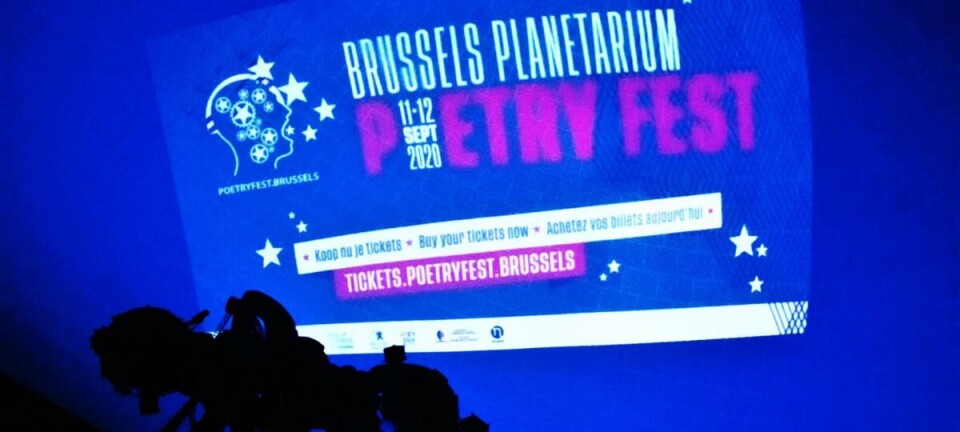article> Arts & Culture
An Evening at the Brussels Planetarium Poetry Fest

“It’s like being in a concert venue, an IMAX cinema, and a sensory deprivation chamber all at once.” Arts & Culture Editor Clare Healy reviews the avant-garde Brussels Planetarium Poetry Fest.
by Clare Healy
Arts & Culture Editor
The Brussels International Underground Poetry Fest was first organised in 2014 at the initiative of the poet and teacher Philip Meersman. At its inception, the festival was a three-day event, taking place at various locations across the capital city and featuring academic seminars, book launches, and art exhibitions. Today, it is an entirely different creature: renamed the Brussels Planetarium Poetry Fest, it takes place over two nights and is hosted exclusively by the Planetarium of the Royal Observatory of Brussels. This isn’t due to the coronavirus — the change was made last year, and rather than being a drawback, it serves as a testament to the idea that less is more.
“We used to do a lot of performances in the public space … We could pop up in the south of Brussels, in the north of Brussels, in a street, in a shop, in a window, in a library, in a museum, on a tram, on a bus.” Meersman not only talks about logistical issues with this itinerary but also mentions that with such a wide variety of events, “you split up your audience. For a lot of people it was difficult to sort of identify us, because we were a bit of everything.” So why did the festival’s coordinators choose to settle in the Planetarium, of all places? It’s precisely the oddity of the setting that made it so appealing.
“I’m a very big admirer of Dada,” says Meersman. “If you start there and you go on and you see what they all have done in the whole Dada movement, and the futurists and the cubo-futurist movements, everything has already been done. So we needed to do something different. We try to be a bit neo-avant-garde, in that way.” The festival first incorporated a night at the Planetarium in 2015, and in subsequent years, Meersman found that participating artists explicitly asked for the opportunity to perform there more often than anywhere else. It’s not hard to see why — not many poets can say that they’ve performed under a massive dome projection of planets, nebulae and black holes, a visual “translation” of their words, as the festival’s programme states.
Leading us into the auditorium, Meersman reminds us that there will be no subtitles for the texts we’ll hear tonight — this despite the fact that poets will be performing not only in French and Dutch, but also in English, German, and Spanish. According to him, the festival is not about language in the strictest sense of the word, but language “on an emotional level”, a theme which the projections are designed to serve. He explains, as an example, how the engineer charged with devising the projection to accompany Jessy James LaFleur’s piece chose to mix in a 3-D model of a comet in the form of a foetus, as well as an image of the planet Venus, to reinforce the poem’s themes of abortion and the female body.
“We expect a lot from our audience,” says Meersman. “We expect that people, when they see the planet Venus, that they know it is Venus.” He admits that such an approach may leave some audience members perplexed. “Sometimes people don’t get it. It happens. Sometimes, even artists don’t get it.” To counteract this, each individual performance is short — around ten minutes in length, to match what he refers to as people’s “deteriorating” attention spans. “A spoonful of sugar helps the medicine go down,” he adds.
Perhaps the proverbial spoonful of sugar is not so much the duration of the performances as it is the immersive viewing experience. The seats in the auditorium are low and comfortable; you’re invited to recline slightly and watch the dome projection with the same posture you might assume while sitting on your living room sofa after a heavy meal. The screen stretches beyond the edges of your vision and, unable to see the heads of the people in front of you, it’s easy to forget where you are. Only the voices of the poets, and at times a musical accompaniment, keep you grounded in the present moment. It’s like being in a concert venue, an IMAX cinema, and a sensory deprivation chamber all at once.
The festival was both intellectually stimulating and accessible, a balance that’s not easy to strike. Each artist delivered their words with an intensity that shone through the variety of languages, making the overall experience even more engrossing. The highlight of the event for me was the musical performance from vocalist Jaouad and keyboardist Aiko Devriendt; Jaouad’s heavenly voice, coupled with the almost dizzying overhead visuals of moving planets and stars, would provoke an emotional reaction from anyone. Although the festival’s scope has become more niche these past few years, its appeal has become — if you’ll excuse the pun — universal.
Listen back to the full interview with Philip Meersman here
For more regular content
- Follow us on Facebook: https://www.facebook.com/thevoice.loko
- Check out our Instagram page: https://www.instagram.com/thevoice.kuleuven/
- Listen to our podcasts on: https://www.mixcloud.com/The_Voice_KUL_Student_Radio/
For submissions or applications
- Email us at thevoice@loko.be
- Or message us on Facebook





